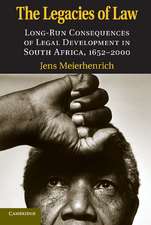Mobilizing for Human Rights: International Law in Domestic Politics
Autor Beth A. Simmonsen Limba Engleză Hardback – 28 oct 2009
Vezi toate premiile Carte premiată
| Toate formatele și edițiile | Preț | Express |
|---|---|---|
| Paperback (1) | 235.32 lei 22-36 zile | |
| Cambridge University Press – 30 aug 2009 | 235.32 lei 22-36 zile | |
| Hardback (1) | 648.69 lei 43-57 zile | |
| Cambridge University Press – 28 oct 2009 | 648.69 lei 43-57 zile |
Preț: 648.69 lei
Preț vechi: 728.87 lei
-11% Nou
Puncte Express: 973
Preț estimativ în valută:
124.12€ • 129.95$ • 102.71£
124.12€ • 129.95$ • 102.71£
Carte tipărită la comandă
Livrare economică 07-21 aprilie
Preluare comenzi: 021 569.72.76
Specificații
ISBN-13: 9780521885102
ISBN-10: 0521885108
Pagini: 468
Ilustrații: 30 b/w illus. 23 tables
Dimensiuni: 156 x 234 x 25 mm
Greutate: 0.79 kg
Editura: Cambridge University Press
Colecția Cambridge University Press
Locul publicării:New York, United States
ISBN-10: 0521885108
Pagini: 468
Ilustrații: 30 b/w illus. 23 tables
Dimensiuni: 156 x 234 x 25 mm
Greutate: 0.79 kg
Editura: Cambridge University Press
Colecția Cambridge University Press
Locul publicării:New York, United States
Cuprins
1. Introduction; 2. Why international law? The development of the international human rights regime in the twentieth century; 3. Theories of commitment; 4. Theories of compliance; 5. Civil rights; 6. Equality for women: education, work, and reproductive rights; 7. Humane treatment: the prevalence and prevention of torture; 8. The protection of innocents: rights of the child; 9. Conclusions.
Recenzii
'Mobilizing for Human Rights is a magisterial work of scholarship. It substantially advances our understanding of human rights law in domestic and international politics. Due to its exceptional rigor, this book will help settle some of the most highly contested debates, and will surely spark new ones. It constitutes an outstanding achievement for interdisciplinary studies.' Ryan Goodman, New York University School of Law
'Mobilizing for Human Rights brilliantly combines theory and systematic empirical analysis to demonstrate how international human rights law affects state policies by altering the domestic political environment. Beth Simmons has written what will become a classic work integrating the study of international relations with that of domestic politics.' Robert O. Keohane, Woodrow Wilson School of Public and International Affairs, Princeton University
'This is a very powerful study of the impact of international law and the evolution of an international human rights regime. As Simmons notes, the development of such a regime has been a major change in world politics since World War II. Her book provides one of the most well articulated theories of why the human rights regime has evolved as an international treaty system. And it presents one of the most in depth empirical studies of the major elements of that regime. It advances the novel argument that governments sign and comply with human rights treaties because they mobilize domestic groups to demand such behavior. This book will make a major contribution to our study of world politics by showing that international law can matter and that the recognition of human rights can change the behavior of governments.' Helen V. Milner, Princeton University
'Simmons has written simply the most important new work by a social scientist on international law and human rights. This rigorous, persuasive, and theoretically eclectic book should be required reading for any scholar or graduate student interested in the topic.' Kathryn Sikkink, University of Minnesota
'This is one of the most important books on international human rights in decades. For more than thirty years, researchers have tried unsuccessfully to use regression analysis to show that human rights treaties make a difference. In this book, Harvard Professor Beth Simmons cracks the code, developing a well-grounded theory of political contexts in which signing a human rights treaty should yield improved human rights on the ground, and then offering rigorous statistical tests that confirm the theory. This book is a must read for anyone who wants to understand when and how human rights law works.' Professor Richard H. Steinberg, UCLA School of Law
'This book marshals theoretical arguments and empirical evidence to show that, under certain conditions, a state's public law-like commitment in the form of agreeing to an international human rights treaty has a noticeable positive impact on domestic human rights outcomes.' International Affairs
'Mobilizing for Human Rights brilliantly combines theory and systematic empirical analysis to demonstrate how international human rights law affects state policies by altering the domestic political environment. Beth Simmons has written what will become a classic work integrating the study of international relations with that of domestic politics.' Robert O. Keohane, Woodrow Wilson School of Public and International Affairs, Princeton University
'This is a very powerful study of the impact of international law and the evolution of an international human rights regime. As Simmons notes, the development of such a regime has been a major change in world politics since World War II. Her book provides one of the most well articulated theories of why the human rights regime has evolved as an international treaty system. And it presents one of the most in depth empirical studies of the major elements of that regime. It advances the novel argument that governments sign and comply with human rights treaties because they mobilize domestic groups to demand such behavior. This book will make a major contribution to our study of world politics by showing that international law can matter and that the recognition of human rights can change the behavior of governments.' Helen V. Milner, Princeton University
'Simmons has written simply the most important new work by a social scientist on international law and human rights. This rigorous, persuasive, and theoretically eclectic book should be required reading for any scholar or graduate student interested in the topic.' Kathryn Sikkink, University of Minnesota
'This is one of the most important books on international human rights in decades. For more than thirty years, researchers have tried unsuccessfully to use regression analysis to show that human rights treaties make a difference. In this book, Harvard Professor Beth Simmons cracks the code, developing a well-grounded theory of political contexts in which signing a human rights treaty should yield improved human rights on the ground, and then offering rigorous statistical tests that confirm the theory. This book is a must read for anyone who wants to understand when and how human rights law works.' Professor Richard H. Steinberg, UCLA School of Law
'This book marshals theoretical arguments and empirical evidence to show that, under certain conditions, a state's public law-like commitment in the form of agreeing to an international human rights treaty has a noticeable positive impact on domestic human rights outcomes.' International Affairs
Notă biografică
Descriere
This book demonstrates that the ratification of treaties generally leads to better human rights practices on average.
Premii
- Woodrow Wilson Foundation Award Winner, 2010














